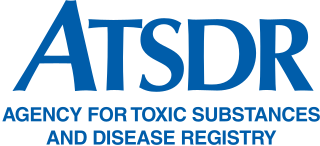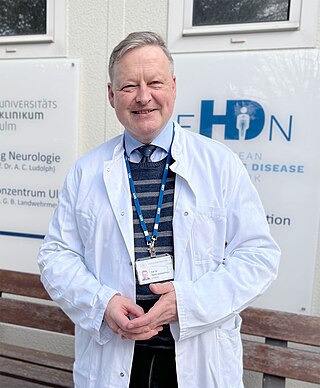Related Research Articles

The Agency for Toxic Substances and Disease Registry (ATSDR) is a federal public health agency within the United States Department of Health and Human Services. The agency focuses on minimizing human health risks associated with exposure to hazardous substances. It works closely with other federal, state, and local agencies; tribal governments; local communities; and healthcare providers. Its mission is to "Serve the public through responsive public health actions to promote healthy and safe environments and prevent harmful exposures." ATSDR was created as an advisory, nonregulatory agency by the Superfund legislation and was formally organized in 1985.

Paul Greengard was an American neuroscientist best known for his work on the molecular and cellular function of neurons. In 2000, Greengard, Arvid Carlsson and Eric Kandel were awarded the Nobel Prize for Physiology or Medicine for their discoveries concerning signal transduction in the nervous system. He was Vincent Astor Professor at Rockefeller University, and served on the Scientific Advisory Board of the Cure Alzheimer's Fund, as well as the Scientific Council of the Brain & Behavior Research Foundation. He was married to artist Ursula von Rydingsvard.

Stanley "Stan" Falkow was an American microbiologist and a professor of microbiology at Georgetown University, University of Washington, and Stanford University School of Medicine. Falkow is known as the father of the field of molecular microbial pathogenesis. He formulated molecular Koch's postulates, which have guided the study of the microbial determinants of infectious diseases since the late 1980s. Falkow spent over 50 years uncovering molecular mechanisms of how bacteria cause disease and how to disarm them. Falkow also was one of the first scientists to investigate antimicrobial resistance, and presented his research extensively to scientific, government, and lay audiences explaining the spread of resistance from one organism to another, now known as horizontal gene transfer, and the implications of this phenomenon on our ability to combat infections in the future.

β-Hexachlorocyclohexane (β-HCH) is an organochloride which is one of the isomers of hexachlorocyclohexane (HCH). It is a byproduct of the production of the insecticide lindane (γ-HCH). It is typically constitutes 5–14% of technical-grade lindane, though it has not been produced or used in the United States since 1985. As of 2009, the Stockholm Convention on Persistent Organic Pollutants classified α-hexachlorocyclohexane and β-HCH as persistent organic pollutants (POPs), due to the chemical's ability to persist in the environment, bioaccumulative, biomagnifying, and long-range transport capacity.

The Michael J. Fox Foundation for Parkinson's Research aims to find a cure for Parkinson's disease (PD) founded in 2000 by Michael J. Fox. It concentrates on funding research and ensuring the development of improved therapies for people with Parkinson's.
Parkinson's disease (PD), or simply Parkinson's, is a chronic degenerative disorder of the central nervous system that affects both the motor system and non-motor systems. The symptoms usually emerge slowly, and as the disease worsens, non-motor symptoms become more common. Early symptoms are tremor, rigidity, slowness of movement, and difficulty with walking. Problems may also arise with cognition, behaviour, sleep, and sensory systems. Parkinson's disease dementia becomes common in advanced stages of the disease.
The Camp Lejeune water contamination problem occurred at Marine Corps Base Camp Lejeune in Jacksonville, North Carolina, from 1953 to 1987. During that time, United States Marine Corps (USMC) personnel and families at the base bathed in and ingested tap water contaminated with harmful chemicals at all concentrations from 240 to 3400 times current safe levels. An undetermined number of former residents later developed cancer or other ailments, which could be due to the contaminated drinking water. Victims claim that USMC leaders concealed knowledge of the problem and did not act properly to resolve it or notify former residents.
Parkinson's disease clinical research is any study intended to help answer questions about etiology, diagnostic approaches or new treatments by studying their effects on human subjects. Clinical trials are designed and conducted by scientists and medical experts, who invite participants to undergo testing new vaccines, therapies, or treatments.
The Pacific Udall Center was established in 2009 as a new Morris K. Udall Center of Excellence for Parkinson's Disease Research. It is one of nine Udall Centers across the U.S. that honor former Utah Congressman Morris Udall with a "multidisciplinary research approach to elucidate the fundamental causes of PD [Parkinson's Disease] as well as to improve the diagnosis and treatment of patients with Parkinson's and related neurodegenerative disorders." The Pacific Udall Center is a collaboration among Stanford University, the University of Washington, the VA Puget Sound Health Care System, Oregon Health & Science University, and the Portland VA Medical Center. It is funded by a grant from the National Institute of Neurological Disorders and Stroke.
The Rare Diseases Clinical Research Network (RDCRN) is an initiative of the US Office of Rare Diseases Research (ORDR). RDCRN is funded by the ORDR, the National Center for Advancing Translational Sciences and collaborating institute centers. The RDCRN is designed to advance medical research on rare diseases by providing support for clinical studies and facilitating collaboration, study enrollment and data sharing. Through the RDCRN consortia, physician scientists and their multidisciplinary teams work together with patient advocacy groups to study more than 200 rare diseases at sites across the nation.
The Rare Diseases Clinical Research Network (RDCRN) Contact Registry is a patient contact registry started in 2004 and sponsored by the National Institutes of Health (NIH). The RDCRN Contact Registry collects and stores the contact information of people who want to participate in RDCRN-sponsored research or learn more about RDCRN research. It connects patients with researchers in order to advance rare disease research.

Moussa B. H. Youdim is an internationally renowned Israeli neuroscientist specializing in neurochemistry and neuropharmacology. He is the discoverer of both monoamine oxidase (MAO) B inhibitors l-deprenyl (Selegiline) and rasagiline (Azilect) as anti-Parkinson drugs which possess neuroprotective activities. He is currently Professor Emeritus at Technion - Faculty of Medicine and President of Youdim Pharmaceuticals.

Alice M. Lazzarini is a scientist, author and researcher on neurogenetic disorders, including Huntington's disease and Parkinson's disease. She is an assistant professor of Neurology at Rutgers Robert Wood Johnson Medical School, where her work helped establish the genetic basis of Parkinson's. Later in life, she was diagnosed with Parkinson's—the very disease she had spent decades researching.

Alim Louis Benabid is a French-Algerian emeritus professor, neurosurgeon and member of the French Academy of Sciences, who has had a global impact in the development of deep brain stimulation (DBS) for Parkinson's disease and other movement disorders. He became emeritus professor of biophysics at the Joseph Fourier University in Grenoble in September 2007, and chairman of the board of the Edmond J. Safra Biomedical Research Center in 2009 at Clinatec, a multidisciplinary institute he co-founded in Grenoble that applies nanotechnologies to neurosciences.
WPDR may refer to:

The Bronowski Institute of Behavioural Neuroscience is an Australian independent not-for-profit medical research institute that is financially supported entirely by philanthropy, that undertakes clinical and basic research into disorders of brain function and addresses problems of altered biological function in animals and man.
Diane G. Cook is a Parkinson’s disease patient advocate, especially well known for the use of the science of self-efficacy to help newly diagnosed patients with Parkinson’s. She accomplishes this through her roles as a senior patient advocate for the ProjectSpark Foundation. Cook also is a present and past clinical investigator on a number of clinical trials, and a speaker, writer and presenter at numerous local, state, national, and international forums focused on Parkinson’s. She was diagnosed with Parkinson’s disease in 2008.
Kochupurackal P. Mohanakumar is an Indian chemical biologist, neuroscientist and the director of Inter University Centre for Biomedical Research and Super Specialty Hospital, Kottayam. He is a former chief scientist at the Indian Institute of Chemical Biology and is known for his studies on Parkinson's disease and Huntington’s disease. The Department of Biotechnology of the Government of India awarded him the National Bioscience Award for Career Development, one of the highest Indian science awards, for his contributions to biosciences in 2000.
The Parkinson's Foundation is a national organization that funds research and provides educational resources to Parkinson’s disease patients and caregivers. The Parkinson's Foundation was established in 2016 through the merger of the National Parkinson Foundation and the Parkinson's Disease Foundation. The Parkinson's Foundation has headquarters in Miami and New York City, in addition to 17 chapters throughout the United States.

Georg Bernhard Landwehrmeyer FRCP is a German neurologist and neuroscientist in the field of neurodegeneration primarily focusing on Huntington's disease. Landwehrmeyer is a professor of neurology at Ulm University Hospital. He was one of the founders of the European Huntington's Disease Network (EHDN) in 2004 and was chairman of its executive committee until 2014.
References
- ↑ Kim, H. M.; Samii, A.; Martinez, E.; Richards, G.; Zabetian, C.; Leverenz, J. B. (2007). "Washington Parkinson disease registry (WPDR): A state-wide research registry". Movement Disorders . 22 (17).